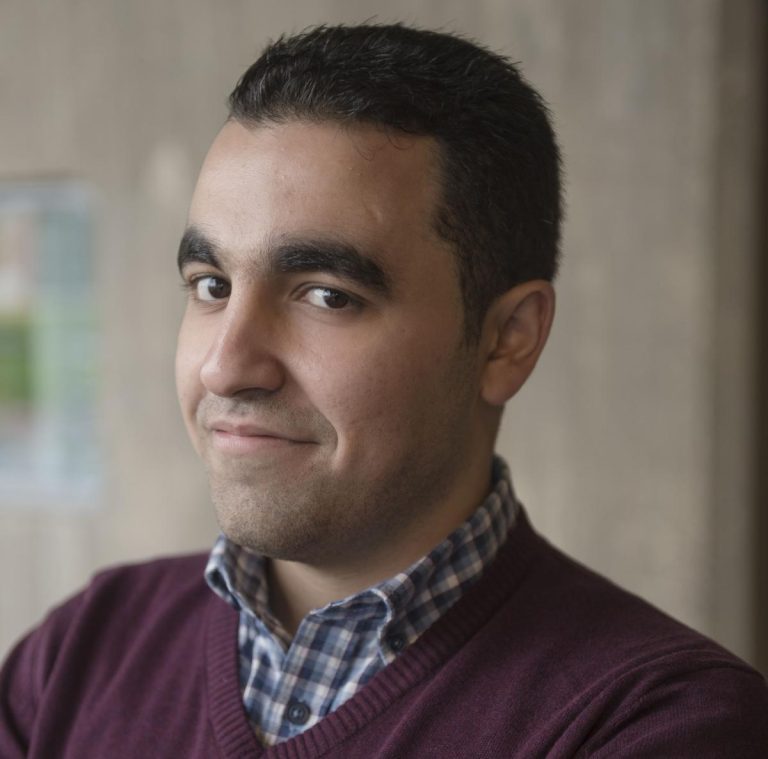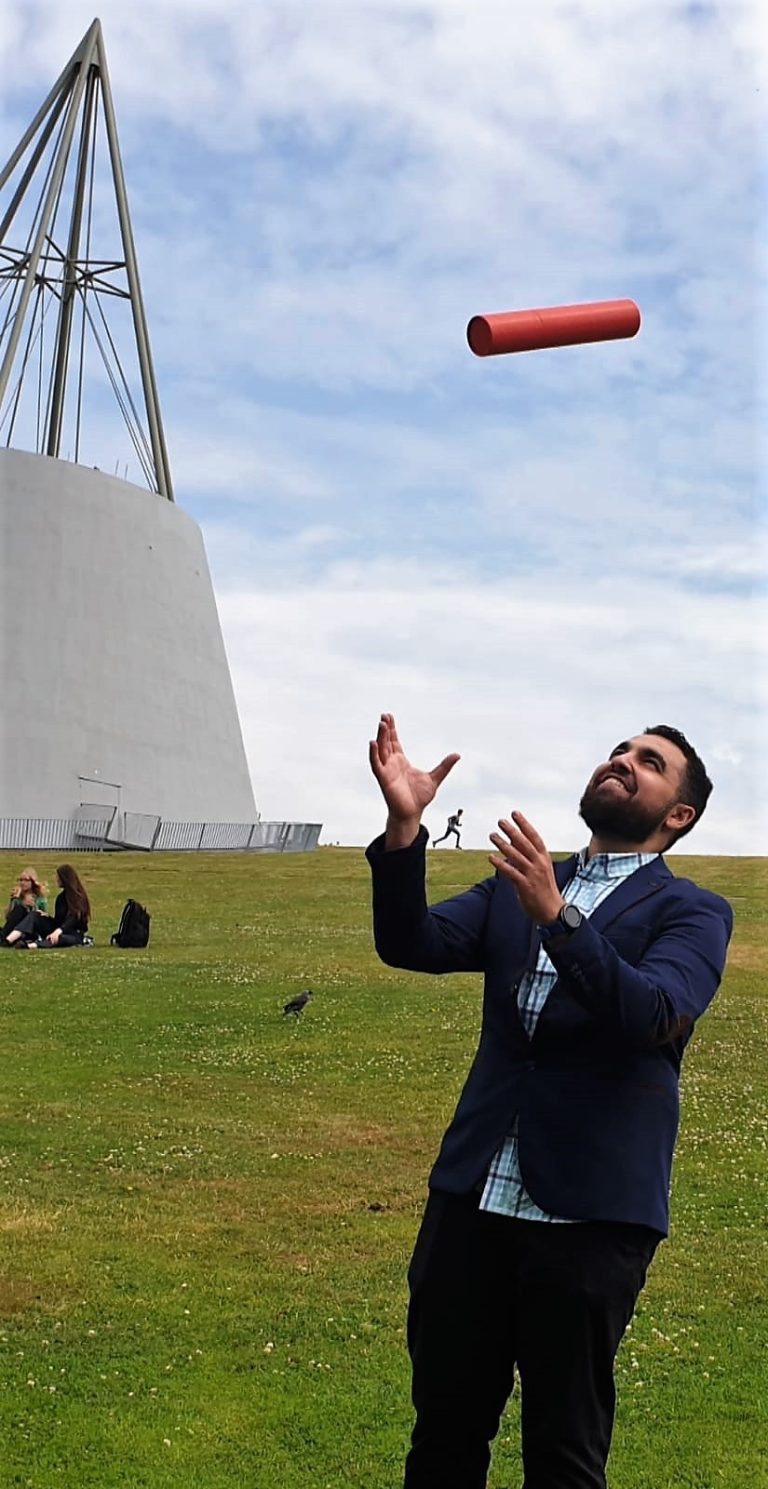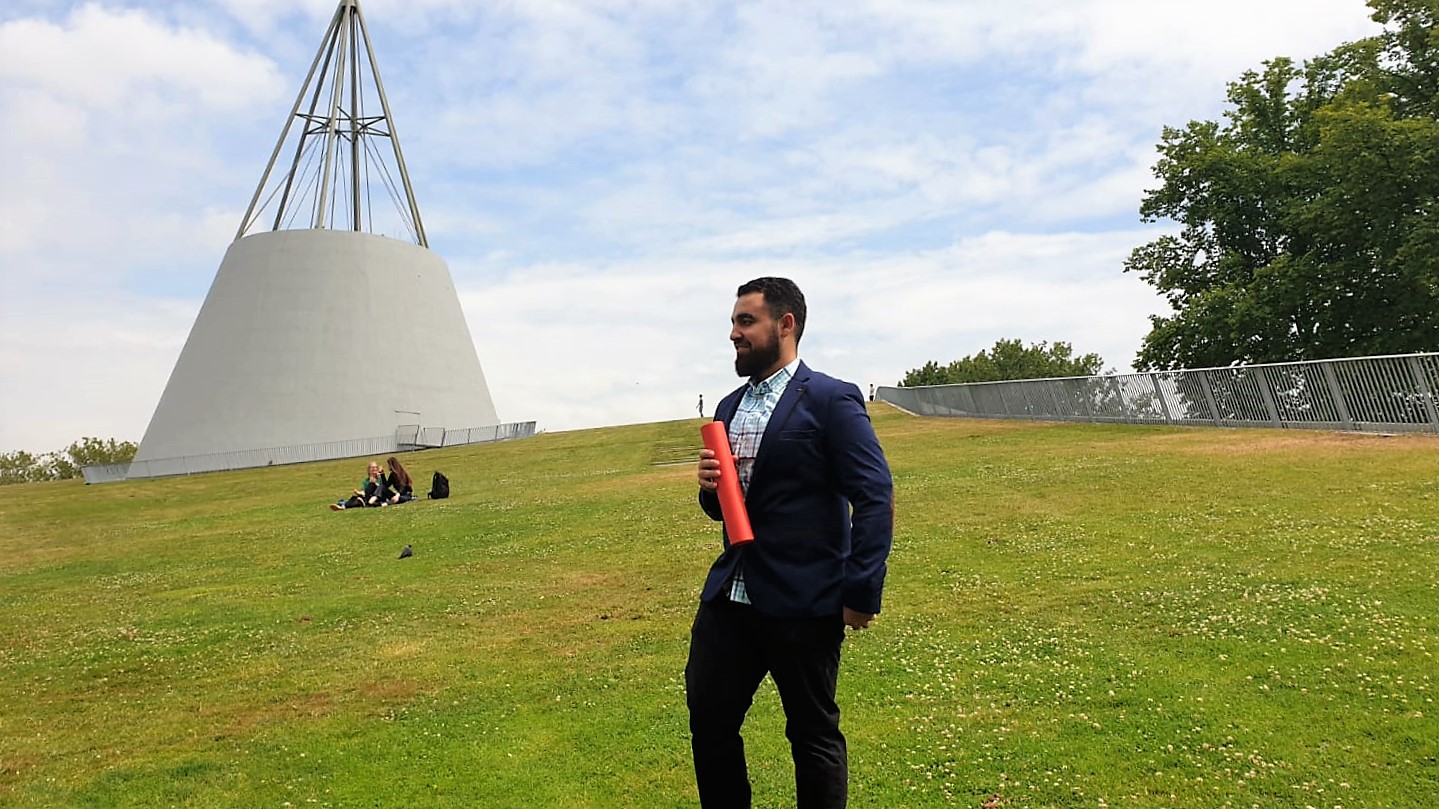Four years ago Amr Ranneh fled from Syria. Last Thursday he graduated from Systems & Control. What is his story?
Twenty-six year old Amr Ranneh is set to be an example to many TU Delft students struggling to find their way. (Photo: Amr Ranneh)
“When I handed in my final draft, for the first time in two-and-a-half years I got to enjoy a weekend off,” he says. “Before that, weekends were optional. I worked hard to get my degree.” But for a long time, it didn’t look like Ranneh would ever attend TU Delft, as he grew up more than 4,000 kilometres away in Aleppo.
Do it yourself
With his father working as a contractor and his mother a dentist, Ranneh enjoyed a comfortable childhood in middle-class Aleppo. “I have two sisters and two brothers, so we were a lively bunch at home. From a young age, I was already into electronics and do-it-yourself projects. I had my little lab, and added new tools now and then.” It sparked a flame and Ranneh enrolled in the engineering programme at the University of Aleppo.
“To get into a programme like that you have to work hard during your last year of high school. Everything depends on your final grades. I studied full-time for five months, during which I memorised tons of notebooks.” Once Ranneh was enrolled he realised that university was the place where he could further develop the passion that he had as a kid.
Uprising
While toiling on his studies in Aleppo, Ranneh wasn’t too bothered about the start of the uprising in Syria during his first year. But when the conflict turned into an armed one and reached his hometown very suddenly, it got real. “The university had to shut down for some time, delaying the new academic year by a month.” But this was nothing compared to the moment when his city endured massive air bombardments from the Assad regime. “During my third year, our neighbourhood was the safest part of the city. The area quickly became very crowded, leading to problems such as electricity outages. If we were lucky we had power for two to three hours every four days.”
‘We created a new normal’
It marked the beginning of a tough time. “The crazy thing is,” says Ranneh looking back, “We adapted so easily to this new life. For instance, when tap water wasn’t available, my friends and I went out to get water for our families. We created a new normal.”
Ranneh, at that point, had already realised that his future might lie somewhere else. He wanted to continue his studies in Turkey. And though his family wasn’t too thrilled about him leaving, they did help him get out of the country. But once Ranneh arrived in Istanbul, he discovered it would be almost impossible to enrol. “At that time Turkish universities did not have a clear regulation for Syrians students. Plus I would have to learn Turkish for at least one year before entering, making it the whole process very difficult.”
Scholarship
Working multiple jobs, Ranneh stayed in Turkey for over five months before making his way back to Aleppo. He realised he had to finish his bachelor’s. So, he caught up, completed his last two years, and earned a partial scholarship from a small university in the United States.
To avoid military service Ranneh had to leave Syria as soon as he had finished his bachelor’s. “So I went to Istanbul again, to get my visa at the American Consulate.” Over there, within five minutes a consular official handed him a paper in Arabic stating that he wouldn’t be granted a visa since he was coming from a conflict area.
On the same day he received notice that he had not passed one of his final exams and therefore did not finish his bachelor’s. He went back to Aleppo, where the situation worsened by the day. He retook his exam, didn’t wait for the results and immediately skipped town. This time four of his friends joined him on a journey that’s still one of his most vivid memories.
Smugglers
Because the legal route had not worked, the group of five decided to try the illegal one. Their final destination would be Germany, where they could continue their studies. They headed to the shores of Izmir in Turkey where you can cross the sea border to Greece.
After three days of looking for smugglers, Ranneh and his friends set foot on a rubber boat. The polyester vessel, barely nine metres long and holding over 40 people, soon attracted the attention of the Turkish coastguard. They took away the fuel tank and said they would come back later and safely tow them back to shore.
 Amr Ranneh three years ago, when he had just started his Master’s programme. (Photo: Marcel Krijger)
Amr Ranneh three years ago, when he had just started his Master’s programme. (Photo: Marcel Krijger)Having paid a large sum of money to get a spot on this boat, the group unanimously decided to push forward no matter what. Led by Ranneh, who had already contacted the Greek coastguard, the boat set course for Greek waters. “People were paddling or swimming alongside the boat,” he recalls. “The Greek coastguard, however, couldn’t do anything for us unless we were in Greek waters. So I had to redirect the boat. Knowing we had more than a kilometre to go, I tried to keep up my spirits and told everyone it was just 400 metres. I was not sure if we were going to make it.”
Cologne saver
Only hours before, the friends had stocked on supplies like water and food. Ranneh also got a big bottle of cologne, which he thought would come in handy as a disinfectant. One of his friends told him it was too big to bring along, but Ranneh insisted. Not knowing he had just packed a lifesaver that got everyone in his boat safely to Greece …
“My friend suggested we put cologne in the engine to see if it would work as a fuel. I don’t know how, but surprisingly it did. Even though it didn’t run smoothly, it gave us a real push.” But more important, it gave the group hope as they could now actually see the ship of the Greek coastguard.
Once on land, they continued their journey. After some frightening moments when they were chased in a cornfield near the Hungarian border, they eventually made it to Austria. For the first time in a while they felt safe.
Upon arriving in Germany, the country in which Ranneh hoped to continue his studies, he noticed a lot of refugees coming in. He spoke to one who was heading to the Netherlands. “He told me the Netherlands was a quiet, peaceful and not so crowded country. That last part had me sold. In hindsight, I was very naive, but that’s how I ended up in the Netherlands.”

For nearly eight months, Ranneh went to and for between asylum centres. “They transferred us from Ter Apel to Goes to Arnhem without any reason.” Filled with uncertainty and unable to work or volunteer, Ranneh spent his time getting to know the Dutch culture and language while looking for possibilities to continue his studies.
Before ending up at TU Delft he visited the campus once. “It was during the Dies Natalis and I realised how prestigious this university was. But I had no idea where I would end up. Once my asylum request would be approved the system would decide where I would get housing. But I continuously told people I wanted to study in Delft. And I don’t know how, but I got permanent placement in Delft. To this day I don’t know who helped me out, but I’m still very grateful.”
False start
By then it was May 2016 and he had just missed the application deadline for the Master Systems & Control. Fortunately, a reporter that documented him on video a couple of months before, reached out and decided to pull some strings. “She contacted the head of the Systems & Control department, and I was invited to a meeting. I delivered a great interview showing how motivated I was.” There was one problem though, admission required a test. And Ranneh hadn’t been in academia for over 16 months. Even though the test wasn’t that hard, he did poorly. He thought he blew all his chances of enrolling. “Until, after just two weeks, I received an email saying my admission was confirmed. I got in!”
He started his first semester with all four courses. Getting along relatively easily, he went into the exam period. And that’s when it all changed. He only cleared one course out of four, a project-based course. “I think I did badly because I came from a different background. For instance, when I went to the Library, I was nervous about where to sit. I just didn’t want to be a burden to anyone.”
Library as a second home
Whoever is looking for a feel-good story might need to hang on a little longer, because Ranneh’s second period went even worse. “I liked the project-based courses, they went well. But I got so stressed about the exams. At that point I earned only three ECTS out of 120, and I thought: okay, this is it. Now I’m going to turn things around. I remember spending three months studying without having any days off. I arrived at the Library at 9 or 10 a.m., attended lectures, worked on some projects and studied to make up for the failed exams.”
After those three months, he’d collected 22 ECTS and went looking for an internship. Not mandatory for his Master’s, but something Ranneh wanted to experience. After seven interviews, he ended up with three ‘yesses’.
‘Tough, but fulfilling’
Because he couldn’t decide which job to take, he consulted the Master’s coordinator for advice. “I was pretty proud, wanted to show him what I had accomplished. But he asked: ‘Amr, have you cleared all your courses yet? Have you contacted someone to be your supervisor?’. Without TU Delft’s permission, companies aren’t allowed to employ me. I was really disappointed.”
Ranneh managed to get an internship in the research and development department of a small company where he worked three days and then spent the remaining four days on his courses. “Tough, but fulfilling,” is how he describes this period. “It was my first time working in the industry and it helped me realise that I also wanted to write my thesis in the field. So I applied and got a spot at Bosch in Boxtel. A challenging one year project in the robotics department that improved both my technical and personal development.”
Future plans
And now Ranneh’s quest for a diploma comes to an end. Anticipating on finishing his Master’s, Ranneh already started applying for jobs earlier this year. “At the moment I have a part-time position at Yes!Delft, but I also have an opportunity with a consultancy company in Eindhoven. So I’m considering moving there.”
For now, he wants to stay in the Netherlands, but with his parents and three of his siblings living in Turkey he might eventually settle down with them. Syria, with the Assad regime still in place, is not an option. “Even though I got used to life here, I miss my family at home and the house where I had my small lab. I also miss my grandmother. She passed away on November 2017, which was sad because she was still in Aleppo and we weren’t there. But for now I’m extremely lucky to just be here. I’m looking forward to celebrating getting a diploma, which I didn’t get the chance to do when I finished my Bachelor’s in Aleppo.”
Do you have a question or comment about this article?
m.vanderveldt@tudelft.nl


Comments are closed.